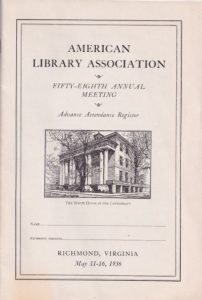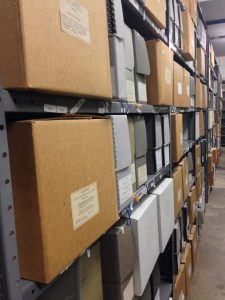This blog post is part of a series exploring the important events and people in ALA’s history for the celebration of the 150th anniversary of ALA in 2026.

Wilson Bulletin editor, Stanley J. Kunitz, called it the “The Spectre at Richmond” – but the racial discrimination at the 1936 ALA Annual Conference was no ghostly apparition.[1] The conference was held in Richmond, Virginia, a city with Jim Crow era racial segregation laws. While the American Library Association itself had no segregation or discriminatory policies, up until 1936 they had not established any ruling against holding a conference in a segregated city where members would be subject to discrimination. Thus, “the Spectre” marched into the halls of the hotels and auditoriums, reminding all librarians present that there was still work to be done. Continue reading “Librarians, Segregated: The 1936 ALA Annual Conference”



